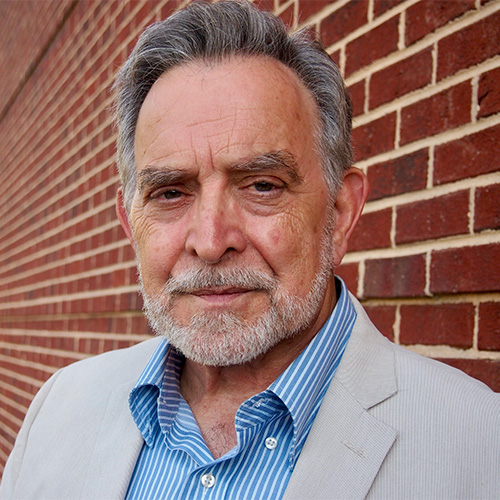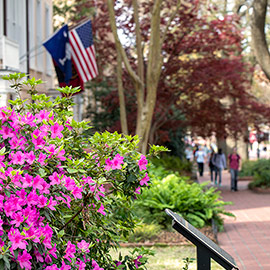Serving as student body president can be a transformative role not only for the university, but also for the individual. We spoke with four former student body presidents to discuss their experiences and how their time at USC aided them in their professional lives.
Sam Drew '68
Sam Drew, a Charleston native, came to USC as a premed major with no interest in student government. He graduated in ‘68 as a double major in biology and psychology, a Chi Psi member and student body president.

It’s safe to say Drew’s majors weren’t the only things shifting during his time as president.
Drew’s platform was originally focused on engaging non-Greek life students in Student Government. At the time, Student Government was almost entirely run by fraternity members. Drew and his campaign knew that to win the election they had to engage all of the student body.
“The main element of our platform was to try and pull together the dorm governments, the Student Union government and Student Government. We were pretty successful in doing that, so we won — by 60 percent.”
His presidency started fairly relaxed, but 1968 was a tumultuous year for Americans: Martin Luther King Jr. was assassinated, Robert F. Kennedy was assassinated, the Tet Offensive changed Americans’ view of the Vietnam War and the civil rights movement was experiencing violent backlash. In Orangeburg, South Carolina — just an hour from USC’s campus — three Black students from South Carolina State University participating in a protest at a local bowling alley were killed and dozens were injured by police in what became known as the Orangeburg Massacre.
Drew knew he had to act when news of the Orangeburg shooting reached Columbia.
“There was a huge uproar, and Columbia was in a sort of a really dire situation with the National Guard stationed all around town. SNCC (the Student Nonviolent Coordinating Committee) was here. Several civil rights groups were in town, and there was a fear that things were really going to blow up,” Drew says.
He acted quickly and organized a memorial on campus with the Afro American Student Organization on USC’s campus to honor the lives lost and to show solidarity with Black students at USC. Drew consulted with then USC President Tom Jones and then Dean of Student Charles (Chuck) Witten and was told the memorial could only continue if Drew and co-planners assumed all responsibility for any violence that might occur.
The memorial ended up being entirely nonviolent, but it wasn’t without backlash. There was no coverage of the event in major news outlets and the Student Senate advanced a resolution to censure Drew. He was almost ousted from his position by the Student Senate. The end result was a vote by the Student Senate to commend him for the service. He said it showed him the potential of the office.
“There could be a real purpose for Student Government, other than just the routine things that Student Government did,” he says.
After his time at Carolina, Drew worked in the business world before finding his career in education. He earned his master’s degree and his Ph.D. in school leadership from USC, he worked for Teacher Corps, and he served as a school principal and district superintendent. He also worked with as a special assistant to the United States Commissioner of Education, as assistant director of education for Gov. Dick Riley, as director of community education in the S.C. Department of Education; he ended his career at Clemson University working as acting executive director for the National Dropout Prevention Center.
Jim Franklin, '89 and '92
It’s hard to imagine a semester without fall break, that long weekend in October that offers students a break from the stress of midterms. But that break didn’t exist until 1988 and the administration of Student Body President Jim Franklin.

Franklin, a South Carolina native, graduated third in his class from Hemingway High School. As an undergraduate at USC, he was in the Honors College and studied political science and economics. He was a member of the Alpha Phi Alpha fraternity and worked as a page at the S.C. State House for Rep. Frank Gilbert, Sen. Hugh Leatherman and U.S. Senator Fritz Hollings. Franklin earned a law degree from USC in 1992 and an MBA from Harvard in 1995.
Franklin was the third Black man to be student body president at USC, and he helped lead the commemoration of 25 years of desegregation at USC.
A large part of Franklin’s time as president was spent making Student Government more responsive to student needs. He advocated against raising tuition and worked to raise private donations for scholarships in the era before lottery-funded scholarships for in-state students. He also led a student group that lobbied lawmakers for better funding for state universities.
“It was, 'Everybody needs to be represented.' Every organization and group needs to be represented, and that's what we did.”
After earning his degrees, Franklin worked as an attorney and lobbyist at the McNair Law Firm in Columbia, for a sports management and marketing firm, a private equity firm and now serves as chief operating officer for Family Pharmacy Services, a supplier of medical products.
Marie-Louise Ramsdale ‘90
Marie-Louise Ramsdale graduated in 1990 from the Honors College with a degree in international relations before earning her law degree from Harvard in 1993.

She was just the third woman to be student body president at USC.
Ramsdale now serves as the managing partner of Ramsdale Family Law in Mount Pleasant, South Carolina, where she focuses on divorce, custody issues, child support and other family law areas. She says her time as student body president was a stepping stone for her legal career.
“What I learned is that you can make a difference,” she says.
Ramsdale worked on several projects during her term as president, including the addition of campus call boxes, which let students call for help from several outside locations on campus in the days before everyone carried a phone in their pocket.
Today, USC’s campus and surrounding Columbia area have even more call boxes for anyone who might need help in an emergency.
“There was a major issue over opposite-sex visitation in campus dorm rooms, and one of the legislators was trying to bar any of that,” Ramsdale recalls. “We were able to reach a compromise working with the Board of Trustees.
“Something that you obviously apply to being a lawyer is the value of compromise — and that compromise is possible.”
Jotaka Eaddy ‘01
Ever since Jotaka Eaddy was in Ms. Askins’ sixth-grade class, which was decorated in garnet and black, she knew she wanted to be a Gamecock.

Eaddy would go on to be more than just an alumna of USC. She would become part of USC history when she became the first Black woman elected as student body president. During her time at USC the Johnsonville, South Carolina, native earned her degree in political science and criminal justice and was heavily involved in Student Government.
Eaddy was no stranger to leadership; she served as her middle and high school student body president, but she had different aspirations for college.
“I really thought that when I got to USC, that I was just going to be a number, but I couldn’t resist,” she recalls. “I went from ‘I'm just going to be a number’ and now I'm in all these clubs and organizations.”
Some of her involvement on campus included: Freshman Council, USC’s chapter of the NAACP and the Association of African American Students. Specifically, through her role on Freshman Council, she grew to be more interested in Student Government and wanted to take on a bigger role.
While she weighed her decision to run for president, difficult news from home gave her the clarity she needed.
“Unfortunately, right before that January, my grandfather died, and I remember coming back to campus, and I was making the decision, ‘Am I really going to do this?’ And I remember thinking about my grandparents and wanting to really honor what they saw in me.”
During her term, Eaddy focused on building up relationships within Student Government and with on-campus groups such as The Daily Gamecock newspaper. During her time as president, she also helped lead the university’s bicentennial celebrations.
“I firmly believe that a really important lesson was that you're not going to win every battle," Eaddy says. "You're just not — and the real measure of your leadership and your success is, how do you overcome that? How do you deal with the setbacks? How do you press forward?”
Today she brings this message into her work in public policy, advocacy and campaigns. She’s worked as a senior advisor for the NAACP and the United Nations Human Rights Council. She founded WinWithBlackWomen and is the founder and CEO of Full Circle Strategies, a consulting firm that works with companies looking to advance and advocate for policy change.
